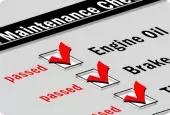When buying a used car, it is essential to check for open recalls before making a purchase. Open recall means that the manufacturer has identified a potential safety issue or defect with the vehicle and is offering free repairs to fix it. This can be done by visiting the manufacturer’s website and entering the VIN. From there, you can see if there are any open or recently closed recall notices related to the vehicle in question.
You can also run a free VIN check at VinCheckPro.com. When you run a VIN check on VinCheckPro.com, the report will provide detailed information about the vehicle’s history, including any previous accidents, title issues, and odometer readings. The report will also include information about any open recalls that have been issued for the vehicle, including the date of the recall, the affected parts or systems, and any recommended steps to take to address the issue.
It is important to keep in mind that even if a recall has been issued, not all vehicles will be affected. However, if an open recall is found on the car you’re interested in, it is best to further investigate the issue. If possible, try to contact previous owners of the car to find out how they addressed the recall, and what issues they experienced as a result.
Checking to see if the vehicle has any open recalls is becoming increasingly common, especially with the rise of online car buying. By doing this, you can save money in the long run as some recalls can be expensive to repair. Being aware of any open recalls before purchase will help ensure you get a safe and reliable vehicle.
Used Car Safety Recall Repair Act
The Used Car Safety Recall Repair Act was enacted by Congress in 2019 and is designed to protect consumers who purchase used vehicles. The law requires car dealers to disclose any open safety recalls on a used car before the sale is finalized. It also requires dealers to repair any open recalls that are associated with the vehicle they are selling, free of charge.
This act ensures that consumers have access to safe, reliable vehicles that meet all safety requirements. It also provides peace of mind for those purchasing a used vehicle, knowing the car has been properly repaired and inspected before they drive away with it. Furthermore, the law helps protect consumer’s financial investment in their vehicle as they can trust that their car meets all applicable safety standards.
Vehicle Recall Laws by State
Vehicle recall laws by state vary greatly, but generally require manufacturers to notify consumers when a recall has been issued and to provide information on the parts needed to repair the vehicle. Some states may also require that the manufacturer provide free repairs, reimbursement of expenses incurred due to the recall, or a refund of the purchase price if the defect is not repaired in a timely manner.
Some states may have additional rules and regulations such as requiring vehicle owners to keep records of all repairs or providing an affidavit of compliance with all recalls. Vehicle owners should be aware of their state’s laws regarding recalls and contact their local motor vehicle department for more information if necessary.
How long do vehicle recalls last?
Vehicle recalls can last a few weeks or even longer, depending on the severity of the issue. In some cases, the recall may only last a few days if the manufacturer is able to quickly identify and address the problem. However, for more serious issues, such as safety-related recalls, manufacturers must take more time to thoroughly investigate and address any potential risks.
The length of time required to complete the recall process varies from case to case, with some lasting several months or longer. To ensure that all affected vehicles are properly addressed in a timely manner, manufacturers will often monitor and assess recall progress through periodic updates. Consumers should keep an eye out for any relevant recall notices as they may be required to bring their vehicle in for repairs in order to remain safe on the road.
How long do recalls take to fix?
Recalls typically take a few weeks to be completed. Once a recall is initiated, the manufacturer will contact all affected customers and provide further instructions. The customer is then responsible for getting their vehicle to an authorized dealer. Depending on the severity of the issue, repairs may take anywhere from 30 minutes to several hours.
In some cases, parts may have to be ordered for the vehicle before the repairs can begin. In cases where special tools are required or additional service bulletins must be followed, repairs can take even longer. Customers should also keep in mind that recalls tend to happen in batches and many customers could have similar issues at the same time, so delays might occur due to high demand for service appointments.
How much does it cost to fix a recall on a car?
The cost of fixing a recall on a car can vary depending on the type of recall and the make and model of the car. Generally, recalls are free to repair, since they are issued by car manufacturers to fix safety-related issues or defects. However, some recalls may require additional labor and parts costs if they involve complicated repairs.
If there is any damage done to the car as a result of the recall issue, such as a corroded brake line, then those repairs can also increase the overall cost. Overall, it is best to contact your local dealership or service center for an estimate on what it will cost to repair a specific recall on your vehicle.
What happens if you ignore a recall on your car?
Ignoring a recall on your car can be a dangerous choice. If the recall involves an important safety component, like brakes or airbags, and it is not fixed, you may put yourself and others at risk when driving. And if you are in an accident due to an unfixed recall and the other party finds out that the recall was ignored, they may sue you for negligence.
Furthermore, your car insurance company may decide to cancel your policy if they find out that you have failed to fix a recall. Lastly, fixing any recalls as soon as possible can help maintain the value of your car over time because buyers will know that all recalls were completed. Therefore, it is always best to follow up on any car recalls as soon as possible.

